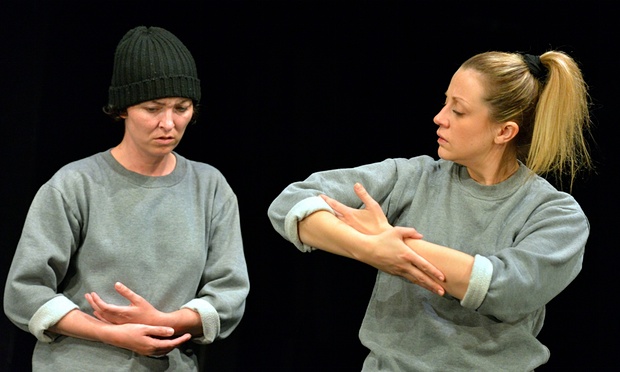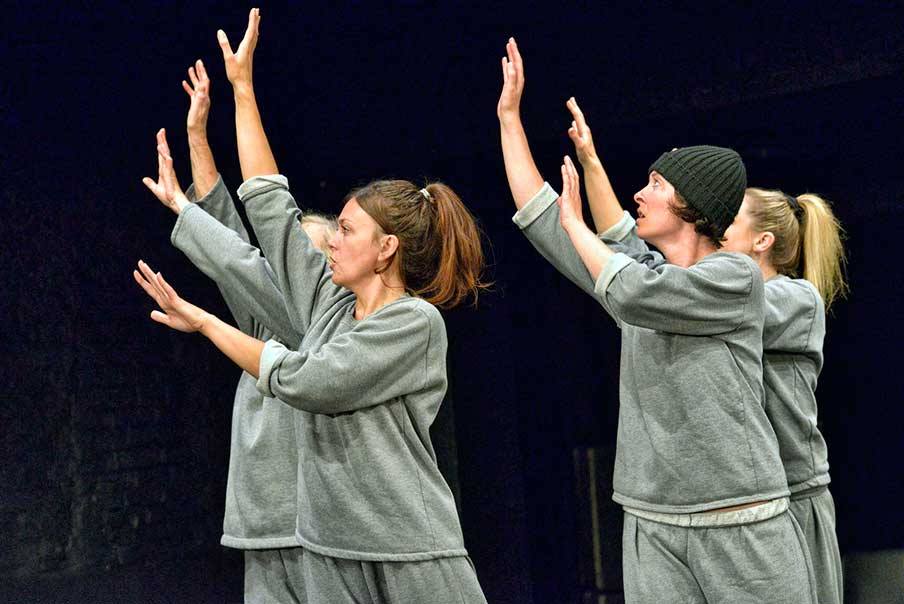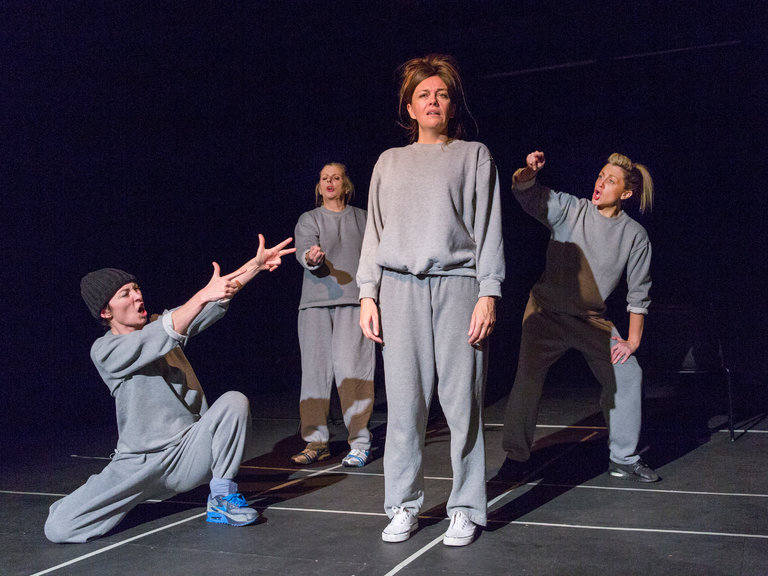Open Clasp performance of Key Change at the Houses of Parliament
In this blog post, Chair of the National Criminal Justice Arts Alliance Alison Frater talks about a collaborative event at the Houses of Parliament on 25th October. The event, hosted by the National Criminal Justice Arts Alliance and held in conjunction with Clinks, the Prison Reform Trust and Agenda: Alliance for Women and Girls at Risk, saw a performance of Open Clasp’s ‘Key Change’ followed by a panel discussion.
“There are arts that distress us and arts that comfort us”
The event at the Houses of Parliament came at a time when ministers are considering options for their reform agenda for the Criminal Justice System, and sought to help parliamentarians and policy makers to fully understand the complex journey many women face when they come into contact with courts and prisons – and the impact of abusive relationships on their lives and the lives of their children.
Devised by women in HMP Low Newton, the play’s author and co-founder of Open Clasp Catrina McHugh explained that it was first intended as a small project that could speak for women but also resonate with men imprisoned for violence against women. But, she said, “it grew wings, took flight and soared high above the razor wire.”
Baroness Anna Healy of Primrose Hill chaired the session. She introduced the event by talking about the continued high rate of incarceration of women for non-violent – and often first time – offences. The disastrous consequences for them and their children has been well documented by a great many reports, including reports by the Chief Inspector of Prisons and the Justice Select Committee as well as various advocacy groups. Most compelling was Baroness Corston’s in depth report, which was commissioned by the government in 2007: ‘A review of women with particular vulnerabilities in the Criminal Justice System.’ We were delighted that Baroness Corston was able to join us for the event and comment on the landscape since her report was published nine years ago.
 Baroness Corston paid tribute to Baroness Healy for chairing the event. She talked about her dismay that almost 10 years since the publication of her report, the recommendations, though accepted by successive governments, had not been implemented. This failure to act has had disastrous consequences. She noted that the rationale for her report had been the increase in deaths by suicide of women in HMP Styal in 2003. She spoke of her alarm that in the year to date the rate of self-inflicted deaths amongst women in prison was now at a far higher rate than the level reported nationally at that time. She acknowledged the need for imprisonment for serious crimes though noted that “most women commit low level crimes, and that those subject to domestic violence or abuse themselves are still seriously overrepresented in prisons.” She talked over the need for “justice to address issues leading to women’s offending before imprisonment becomes a serious option.” She emphasised the importance “for individuals, communities and wider society in helping women rebuild their lives, and to provide safety and security for children and families.”
Baroness Corston paid tribute to Baroness Healy for chairing the event. She talked about her dismay that almost 10 years since the publication of her report, the recommendations, though accepted by successive governments, had not been implemented. This failure to act has had disastrous consequences. She noted that the rationale for her report had been the increase in deaths by suicide of women in HMP Styal in 2003. She spoke of her alarm that in the year to date the rate of self-inflicted deaths amongst women in prison was now at a far higher rate than the level reported nationally at that time. She acknowledged the need for imprisonment for serious crimes though noted that “most women commit low level crimes, and that those subject to domestic violence or abuse themselves are still seriously overrepresented in prisons.” She talked over the need for “justice to address issues leading to women’s offending before imprisonment becomes a serious option.” She emphasised the importance “for individuals, communities and wider society in helping women rebuild their lives, and to provide safety and security for children and families.”
Baroness Healy then introduced the play; a unique event in the Houses of Parliament. The play, she noted, provided a means for women to tell their stories whilst raising awareness about the urgent need for reform.
‘Key Change’ shares the life stories of four women: Angie, Lucy, Kelly and Kim. Moving between past and present it introduces other characters including abusive partners, parents, traumatised children, the courts and prison officers. The audience learn about the women’s lives before prison and in the close confinement of a moribund and hostile prison wing. ‘Key Change’ has a raw but rich texture. Talking about being kicked out of home at 16, being homeless, getting pregnant, losing children to the care system, being unable to care for elderly parents – or to live a ‘normal’ life, depression and other mental illness, experiencing domestic violence, facing alcohol and drug addiction. It is tragic and funny. The women are vulnerable though not weak, they despair, they dream, they fight, they support each other.
 Following the production, a discussion amongst panel and audience looked at how the play had resonated with and changed entrenched attitudes amongst men in prison, and amongst prison officers who said that the play had a transforming impact. Jenny Earle from the Prison Reform Trust and Kate Paradine from Women in Prison set out the small practical steps local authorities and the health system needed to make in order to realise big difference to women and their children. Where services work together, such as through women’s centres, they can overcome barriers to health and social care – this includes community services for women at risk of domestic violence. Building capacity in the community would also end recourse by the courts to short sentences for low level crime which mean that many women lose their homes, their jobs and their children. Women on community sentences are less likely to reoffend than those given custodial sentences for equivalent crimes and so the benefits to community safety are real and realisable.
Following the production, a discussion amongst panel and audience looked at how the play had resonated with and changed entrenched attitudes amongst men in prison, and amongst prison officers who said that the play had a transforming impact. Jenny Earle from the Prison Reform Trust and Kate Paradine from Women in Prison set out the small practical steps local authorities and the health system needed to make in order to realise big difference to women and their children. Where services work together, such as through women’s centres, they can overcome barriers to health and social care – this includes community services for women at risk of domestic violence. Building capacity in the community would also end recourse by the courts to short sentences for low level crime which mean that many women lose their homes, their jobs and their children. Women on community sentences are less likely to reoffend than those given custodial sentences for equivalent crimes and so the benefits to community safety are real and realisable.
The panel also included two women who had worked with theatre companies whilst they were in prison. One a Clean Break participant, the other an Open Clasp participant, they spoke about the impact of these interventions on their lives. One said: “I had been so devastated by being sent to prison – it was a first offence and no one, not even my solicitor, thought I would get a custodial sentence. I could barely come out of my cell for weeks. But then I got involved with a theatre workshop and suddenly felt able to cope again – it saved my life and when I got out of prison the lifeline continued because the experience helped me find work.”
Catrina McHugh of Open Clasp summed up the mood: “The theatre creates empathy. The audience step into the shoes of the women and walk in them, see it from their point of view. T they think – OK, this is why we need to do things differently. It builds the arguments for non-custodial punishments in a unique and effective way.”
 Advocating for change
Advocating for change
Bringing the play to the Houses of Parliament attracted national media coverage with Open Clasp’s staff and participants speaking on Women’s Hour on the morning of the performance. Many MPs and Peers attended the event and we urged them to consider the issues raised in the performance as driver to call for four specific changes. These included:
- A new strategic focus on female offenders and those at risk of offending. Ten year on from the Corston report, we must build on and accelerate progress.
- Improved and sustained funding for community services for women, including proceeds from the sale of HMP Holloway to be reinvested in women’s community based services.
- Alternatives to custody for women and especially for mothers with young children.
- A review of the impact of Transforming Rehabilitation on women.
We will watch and wait, hoping that our ambitions to impact policy change through theatre are met.
– Alison Frater






